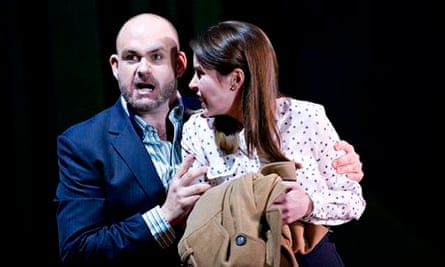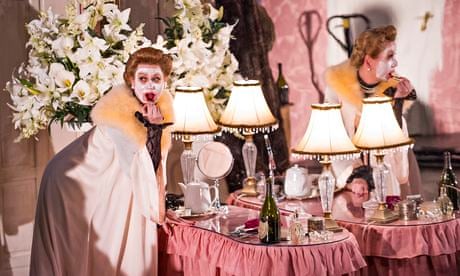"She is a Don Juan among women," pronounces the judge, summing up the high-society divorce trial in Powder Her Face. He condemns the Duchess – she whose face requires powdering – as unfit for marriage, perverted and insatiable, with sexual predilections "seldom found north of Marrakech". The peach-satin negligee, lilac bath, white telephone, gilded hostess trolley, potted palms: all must go. Meanwhile her husband – whose little mistress calls him a squiffy daddy – is deemed spotless. It's a shocking moment and a brilliant reversal of the operatic norm.
Of the many singular aspects of Powder Her Face, from rapturous musical pastiche to sleazy story, the most extraordinary is that it was first seen nearly two decades ago yet still feels fresh and startling. Written when the composer Thomas Adès and the librettist Philip Hensher were still in their 20s, it already counts as a modern classic, having had several stagings, usually in small venues including the Royal Opera's Linbury Studio.
Now English National Opera has been more daring and encouraged the theatre director Joe Hill-Gibbins, in his first opera, to run wild in Ambika P3, the contemporary arts space in central London which describes itself as "a vast former concrete construction hall", presumably for constructing vast former concrete.
Two or so storeys underground, it feels like a large yet claustrophobic bunker. The audience sat in stepped rows looking down on the action, in Ultz's closely observed designs, of which a rumpled bed was the biggest element. Sight lines were problematic, hearing the sharp-edged, witty text was at times tricky, though perhaps more so for those new to the piece. In any case it's worth a stand-alone read.
The central character loosely resembles Margaret Campbell, Duchess of Argyll, she of the headless-man sex scandal. Her promiscuity and wanton self-destruction resonate with the figure of Berg's Lulu. (Hensher's debut novel, Other Lulus, came out shortly before the opera.) The central role calls for an experienced soprano, here the ever-rewarding Amanda Roocroft.
Her spellbinding performance reflected her fearlessness as an artist. Not many women would wear a highly revealing lace one-piece with the panache she managed, especially not with prying eyes on all sides. If the acoustic was sometimes harsh for high-pitched vocal lines, the small cast of Roocroft, Alan Ewing revoltingly dazzling as the Duke, Clare Eggington and Alexander Sprague was terrific.
Timothy Redmond conducted with energetic vigilance. Difficult though the space was, it allowed Adès's score, in all its richness from tango to two-step via Berg and Stravinsky, to breathe. The entire work acquired a bloom, superbly played by the 15-strong ensemble. At times it felt hot and crackling, as if about to combust. The unearthly, nervy sound of several fishing reels being turned is a typical moment of invention. No doubt you want to know about the blow-job aria. True, it was quite a novelty when the work was new, but fellatio is de rigueur on the operatic stage these days so it hardly needs comment. Still, it had its usual spunk.
This Adès-Hensher work, like Mark-Anthony Turnage's Greek seven years earlier, triggered a new freedom for operas to tackle contemporary issues. It was instructive, the day after Powder Her Face, to witness the world premiere of Through His Teeth (coming soon, Blow Your Nose?) by Luke Bedford and David Harrower, a thriller based on the Faust legend.

Short, pithy and smart, Through His Teeth managed that elusive feat of being at once gripping and amusing. A single woman (Anna Devin) falls for a super-confident greaseball (Owen Gilhooly) purporting to be a car salesman. Never can a pitch about miles to the gallon have sounded so sensuous. She's sold. It's a dark tale of deceit and power, in mood not so far from the US version of House of Cards, the prism through which many of us currently see the world.
Bedford's score is surely his most accomplished so far, often turning down the aural volume as the drama grows noisier – to bracing effect. Simple tonal devices and horizontal instrumental lines shatter into spiky microtones. Piano, accordion and harp give a fullness to the chamber ensemble sound. The conductor Sian Edwards, Chroma, Victoria Simmonds (the third cast member), director Bijan Sheibani and designer Becs Andrews all contributed to a stylish, provocative, up-to-the-minute show.
This, together with another Faustian commission, The Crackle, comes in the week the Royal Opera House announced a 2014/15 season including four world premieres and the return of Turnage's Anna Nicole. In addition to the expected strong mainstream repertoire, and news that Antonio Pappano will remain as music director until at least 2017, there are tectonic shifts going on at Covent Garden, not necessarily obvious to the naked eye.
I understand why many still see only the fat-cat corporate side of the opera world, epitomised by the sheer, red-plush grandeur of the Royal Opera House. It's the most expensive art form and, at these world-competing standards, hoovers up cash, public and private. But chief executive Tony Hall, and now his successor, Alex Beard, could hardly try harder in the egalitarian quest.
At next season's opening night, the whole auditorium will be given over to students – currently 27,000 of them regularly book seats – with tickets costing from £1 to £25. There are family matinees (£5 to £20), school matinees reaching 10,000 children, tickets for "older people facing isolation" (no we're not talking critics) and uniformly lower prices for contemporary works. Half a million people have seen the free Big Screen showings, and 100,000 saw Giselle in cinemas recently. The degree to which regular opera relays to some 400 cinemas has revolutionised access to opera is mind-boggling.
There are tea dances and free recitals. The building is open to all during the day. True, the sandwiches cost roughly the same as a garage in Mayfair but there's no obligation to eat them. The cheapest (standing at the back) tickets for Kate Bush at Hammersmith Apollo were snapped up recently at £49 each. At the Royal Opera House in July you can hear Angela Gheorghiu in Bohème for £9. Let's not mention the price of football, or even cricket. No doubt the Royal Opera House could do more. I'm stumped to know what, right now.
Star ratings (out of 5)
Powder Her Face ****
Through His Teeth ****

Comments (…)
Sign in or create your Guardian account to join the discussion